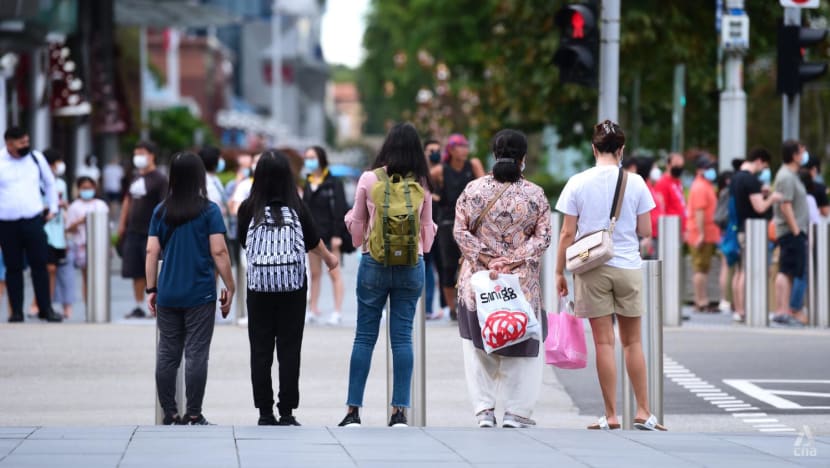More safeguards should be included in ‘Buy now, pay later’ code of conduct: CASE
Consumers should be allowed to set purchase limits for themselves, the Consumers Association of Singapore (CASE) suggested.

People along Orchard Road in Singapore on Jan 5, 2022. (Photo: CNA/Gaya Chandramohan)
SINGAPORE: The Consumers Association of Singapore (CASE) is calling for more safeguards to be included into a newly-announced code of conduct for “Buy now, pay later” (BNPL) providers, including a lower cap on maximum purchases for users below 21 years old.
In a Facebook post on Friday (Oct 21), CASE president Melvin Yong said the industry code was “a step forward but more can be done”.
BNPL allows users to pay for purchases over time. It differs from usual instalment plans by enabling one to split the cost for small-ticket everyday items at zero interest and without having to own a credit card.
To address concerns about potential debt accumulation, the code of conduct – announced on Thursday by a working group led by the Singapore FinTech Association (SFA) – sets out several guidelines such as platforms imposing a S$2,000 limit on outstanding payments for each customer unless additional credit worthiness assessments are done.
But Mr Yong said there should be a lower limit on the maximum purchases allowed for those under 21, as the majority of younger consumers between the ages of 18 and 21 do not earn an income.
The code states that BNPL providers can only offer their services to those who are at least 18 years old.
Mr Yong also suggested that consumers be allowed to set purchase limits for themselves so as to guard against "excessive and untenable monthly instalments”.
“We hope that SFA and the BNPL working group will review these considerations and refine the code of conduct to further safeguard the interests of consumers,” he wrote.
In June, CASE raised concerns about the rising use of BNPL services, which it described as potentially giving consumers a “false perception of increased purchasing power”, leading them to spend beyond their means.
The consumer watchdog noted that it received 18 complaints involving BNPL services over the past one-and-a-half-years, and urged for consumer safeguards to be put in place.
Several of its suggestions, such as setting limits for both consumers and BNPL providers, regulating advertisements and ensuring a clear recourse avenue for consumers, have since been included in the code of conduct, said Mr Yong.
“I’m also glad to see that the code of conduct incorporates consumer-friendly practices like allowing consumers to make full repayment at any time without any early repayment fees and allowing consumers to voluntarily exclude themselves from BNPL services and promotional materials,” he added.
The new code will also require BNPL providers to undergo an audit and accreditation process before being awarded a trustmark to show that they are compliant. In addition, the industry is looking to set up a credit information sharing bureau. These are expected to be completed by late-2023.
Mr Yong, in his Facebook post, said CASE is looking forward to hearing more about these initiatives, although it hopes that they can “be expedited so that consumers who intend to use BNPL services can approach service providers compliant with the code of conduct”.
Meanwhile, Mr Yong urged consumers looking to use BNPL services to understand the terms and conditions before entering into a BNPL agreement, as well as set aside money for monthly instalments.
Those who encounter disputes with BNPL service providers can also approach CASE for assistance, he added.

















